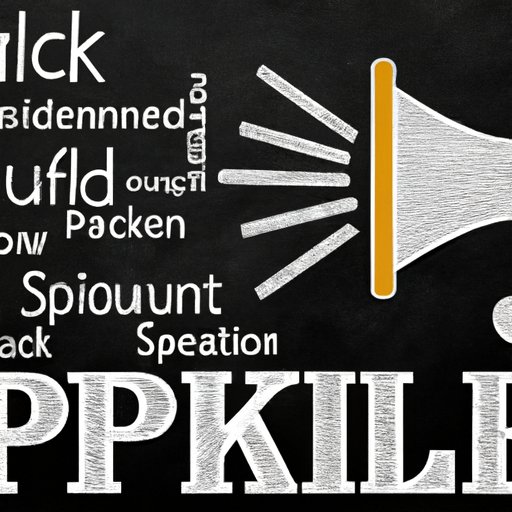Introduction
Being heard is about more than just making noise – it’s about having your opinion and ideas taken seriously. When you’re being heard, you have the opportunity to make an impact and have your voice matter. Whether you’re in a meeting, on social media, or simply interacting with others, there are many ways to ensure your voice is heard. In this article, we’ll explore strategies for making your voice count.
Speak Up in Meetings
One of the most effective ways to be heard is to speak up in meetings. Whether it’s a weekly team meeting or a one-on-one with your manager, meetings are an ideal setting for voicing your opinion. But identifying opportunities to speak up can be a challenge. To make sure your voice is heard, it’s important to pay attention and look for moments when your input could be valuable. This could include offering solutions to problems, sharing relevant experiences, or providing constructive criticism.
Once you’ve identified an opportunity to voice your opinion, it’s important to make sure your input counts. Here are a few tips for making your speech count:
- Be concise and clear – don’t ramble or get sidetracked.
- Listen to other opinions before sharing your own.
- Don’t be afraid to ask questions.
- Make sure your point is relevant and adds value.
- Stay calm and focused on the topic at hand.
Leverage Social Media
Social media is an incredible platform for connecting with people and having your voice heard. Platforms like Twitter, Instagram, and LinkedIn provide an opportunity to share your thoughts and engage with like-minded individuals. Through social media, you can join conversations, start discussions, and even create your own content – all of which can help you make your voice heard.
When it comes to leveraging social media, it’s important to stay active and engaged. Comment on posts, share relevant articles, and interact with others – all of which can help you build relationships and expand your reach. Additionally, it’s important to tailor your content to the platform. For example, Twitter is great for quick thoughts and reactions, while Instagram is better suited for visuals and stories.
Practice Good Listening Skills
In order to be heard, it’s important to understand the importance of listening. Being an active listener means paying attention to what’s being said and understanding the speaker’s perspective. Active listening is key to fostering meaningful conversations and building relationships – both of which can help you have your voice heard.
Here are a few strategies for becoming an active listener:
- Pay attention and focus on what’s being said.
- Avoid distractions such as phones and other devices.
- Ask clarifying questions to ensure understanding.
- Show interest by nodding, smiling, and making eye contact.
- Provide feedback and show appreciation for what’s being shared.
Create Visual Aids
Visual aids are a great way to make your voice heard. Whether it’s a presentation, infographic, or video, visuals can help you communicate your message more effectively. Visuals can also help capture and maintain audience attention, and make complex topics easier to understand.
Examples of visual aids include:
- Slideshows
- Charts and graphs
- Videos and animations
- Infographics
- Photos and illustrations
When creating visual aids, it’s important to keep them simple and relevant. Keep your visuals clean and organized, and make sure they’re tailored to the audience. Additionally, consider using storytelling techniques to make your visuals more engaging.
Develop a Strong Network
Having a strong network not only helps you stay connected and informed, but it can also help amplify your voice. Building connections with other professionals in your industry can open doors to new opportunities and help you get your name out there. It’s also important to nurture your existing relationships and stay in touch with those who can help you reach your goals.
Here are a few strategies for growing your network:
- Reach out to people in your field.
- Attend events and conferences.
- Look for networking opportunities.
- Engage with others on social media.
- Follow up with contacts regularly.
Conclusion
Making your voice heard can be challenging, but it’s an essential part of gaining recognition and having your opinion matter. By speaking up in meetings, leveraging social media, practicing good listening skills, creating visual aids, and developing a strong network, you can ensure your voice is heard and make a lasting impact.
Take action today and start putting these strategies into practice. Once you start seeing results, you’ll be glad you made the effort to be heard.
(Note: Is this article not meeting your expectations? Do you have knowledge or insights to share? Unlock new opportunities and expand your reach by joining our authors team. Click Registration to join us and share your expertise with our readers.)
